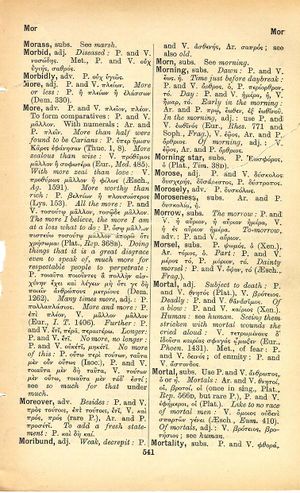mortal: Difference between revisions
ἀμήχανον δὲ παντὸς ἀνδρὸς ἐκμαθεῖν ψυχήν τε καὶ φρόνημα καὶ γνώμην, πρὶν ἂν ἀρχαῖς τε καὶ νόμοισιν ἐντριβὴς φανῇ → hard it is to learn the mind of any mortal or the heart, 'till he be tried in chief authority | it is impossible to know fully any man's character, will, or judgment, until he has been proved by the test of rule and law-giving
m (Text replacement - "<b class="b2">Eum.</b>" to "''Eum.''") |
(2) |
||
| Line 12: | Line 12: | ||
<b class="b2">Like to no race of mortal men</b>: V. [[ὅμοιος]] οὐδενὶ σπαρτῶν γένει (Aesch., ''Eum.'' 410). | <b class="b2">Like to no race of mortal men</b>: V. [[ὅμοιος]] οὐδενὶ σπαρτῶν γένει (Aesch., ''Eum.'' 410). | ||
<b class="b2">Of mortals</b>, adj.: V. [[βρότειος]], [[βροτήσιος]]; see [[human]]. | <b class="b2">Of mortals</b>, adj.: V. [[βρότειος]], [[βροτήσιος]]; see [[human]]. | ||
}} | |||
{{esel | |||
|sltx=[[ἀναιρετικός]], [[δυσαλθής]], [[βρότειος]], [[βροτήσιος]], [[βρότεος]], [[βροτός]], [[γηγενής]], [[δηλητηριώδης]], [[ἄφυκτος]], [[ἀποδημητικός]] | |||
}} | }} | ||
Revision as of 06:43, 22 August 2017
English > Greek (Woodhouse)
adj.
Subject to death: P. and V. θνητός (Plat.), V. βρότειος. Deadly: P. and V. θανάσιμος. Of a blow: P. and V. καίριος (Xen.). Human: see human. Seeing them stricken with mortal wounds she cried aloud: V. τετρωμένους δʼ ἰδοῦσα καιρίας σφαγὰς ᾤμωξεν (Eur., Phoen. 1431). Met., of fear: P. and V. δεινός; of enmity: P. and V. ἄσπονδος. subs. Use P. and V. ἄνθρωπος, ὁ or ἡ. Mortals: Ar. and V. θνητοί, οἱ, βροτοί, οἱ (once in sing., Plat., Rep. 566D, but rare P.), P. and V. ἐφήμεροι, οἱ (Plat.). Like to no race of mortal men: V. ὅμοιος οὐδενὶ σπαρτῶν γένει (Aesch., Eum. 410). Of mortals, adj.: V. βρότειος, βροτήσιος; see human.
Spanish > Greek
ἀναιρετικός, δυσαλθής, βρότειος, βροτήσιος, βρότεος, βροτός, γηγενής, δηλητηριώδης, ἄφυκτος, ἀποδημητικός

